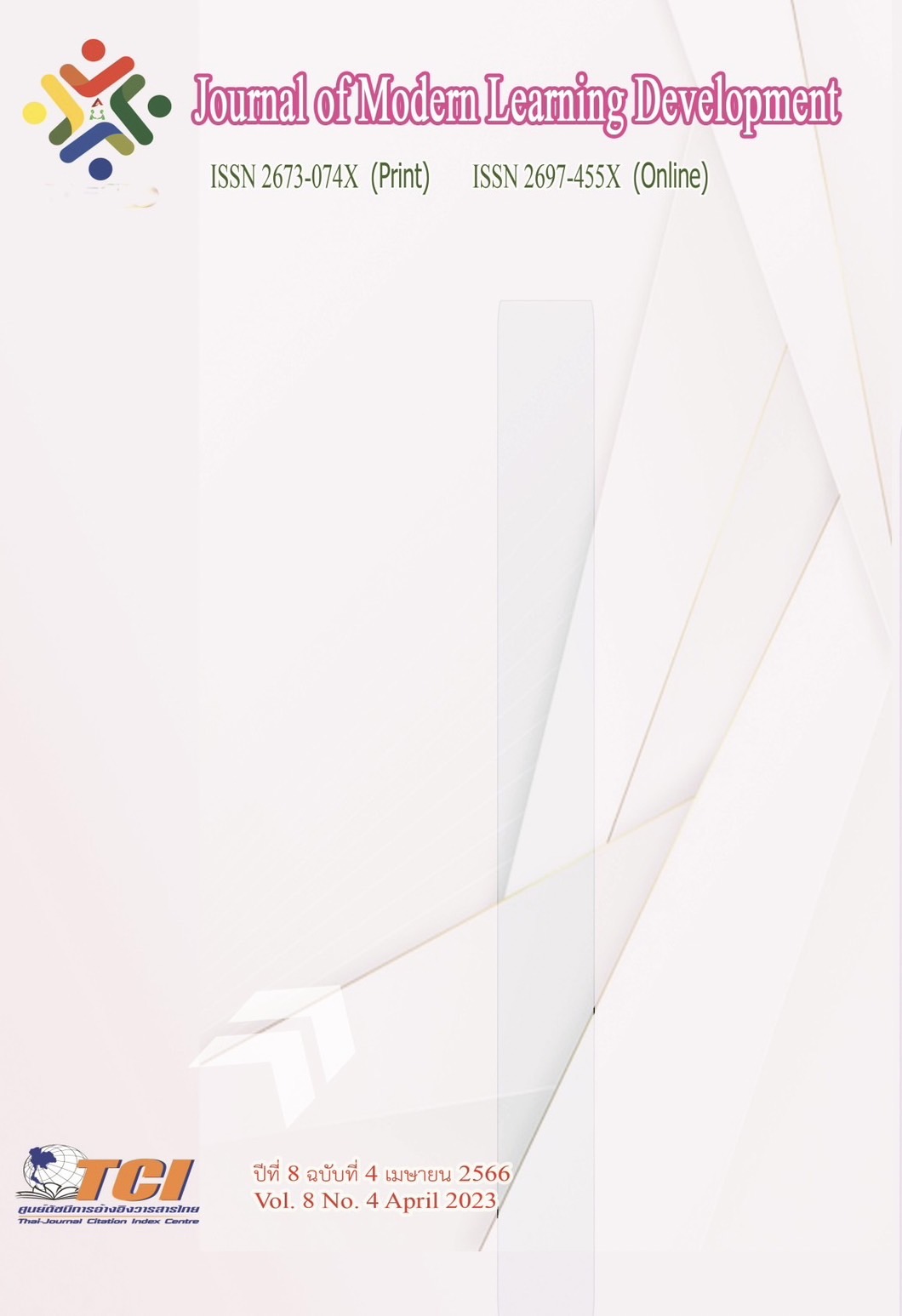Marketing Mix Factors Affecting the choice of Food Ordering Service Delivery Through the Application
Main Article Content
Abstract
This research aims to study the personal factors affecting the choice of food ordering service via the app. and to present the marketing mix factors that affect the choice of food delivery service via the app. The research employs a quantitative method. The study sample consisted of 400 consumers or service users in Samut Sakhon area who chose to order food delivery service via the application. The research instrument was a statistical questionnaire used to analyze the data. These were frequency, percentage, mean, standard deviation, T-Test one-way ANOVA and multiple linear regression analysis.
The results showed that Consumers or service users in Samut Sakhon who choose to order food delivery service through the application with personal factors such as gender, age, educational level, and different occupations that affect the decision to choose a food delivery service via the application is not different. The portion and the average monthly income affect the decision to choose a food delivery service through the application differently. 0.05 The marketing mix factor was positively correlated with the decision to choose a food ordering service via the app with a statistical significance of 0.05. Therefore, it was concluded that Marketing mix factors influenced the decision to choose a food delivery service via app with a statistical significance of 0.05.
Article Details
References
กรมพัฒนาธุรกิจการค้า กระทรวงพาณิชย์. (2564). สถานการณ์ที่มีการเปลี่ยนแปลงไปนั้น ผู้ประกอบการมีการพัฒนา Platfrom. ออนไลน์. สืบค้นเมื่อ 15 สิงหาคม พ.ศ. 2565. แหล่งที่มา: https://www. dbd.go.th/ more_news.php?cid=1083.
กฤชฐา ตรูวิเชียร. (2560). ปัจจัยที่มีผลต่อความต้องการของผู้บริโภคในการใช้บริการร้านอาหารญี่ปุ่นในศูนย์การค้า เซ็นทรัล เวิลด์. วิทยานิพนธ์บริหารธุรกิจมหาบัณฑิต. บัณฑิตวิทยาลัย: มหาวิทยาลัยธุรกิจบัณฑิตย์.
จักรกฤษณ์ นาคประเสริฐ. (2556). ปัจจัยที่มีผลต่อพฤติกรรมการใช้บริการร้านไอศกรีมพรีเมี่ยมในศูนย์การค้าเซ็นทรัล พลาซ่า เขตกรุงเทพมหานครและปริมณฑล. การค้นคว้าอิสระบริหารธุรกิจมหาบัณฑิต, บัณฑิตวิทยาลัย: มหาวิทยาลัยเทคโนโลยีราชมงคลธัญบุรี.
นิรวิทธ์ สิระวิทยาวานิช. (2557). ความพึงใจการใช้บริการธุรกิจขนส่งภายในประเทศบริษัทเคอรี่เอ็กซ์เพรสในเขตหนองแขม. สารนิพนธ์บริหารธุรกิจมหาบัณฑิต. บัณฑิตวิทยาลัย: มหาวิทยาลัยสยาม.
วสุดา รังสิเสนา ณ อยุธยา. (2560). ปัจจัยที่ส่งผลต่อพฤติกรรมของผู้บริโภคในการใช้บริการสั่งอาหารผ่านสื่อออนไลน์ในเขตกรุงเทพมหานครและปริมณฑล. วิทยานิพนธ์ศิลปศาสตรมหาบัณฑิต สาขาวิชาการจัดการมรดกวัฒนธรรมและอุตสาหกรรมสร้างสรรค์. บัณฑิตวิทยาลัย: มหาวิทยาลัยธรรมศาสตร์.
วชิรดา วิชยาภัย. (2563). ปัจจัยที่มีผลต่อพฤติกรรมผู้บริโภคในการตัดสินใจใช้บริการสั่งอาหารออนไลน์บนแอพพลิเคชั่นแกร็บฟู้ด (Grab Food) กรณีศึกษาเขตลาดกระบังกรุงเทพมหานคร. วิทยานิพนธ์บริหารธุรกิจมหาบัณฑิต (สาขาวิชาการจัดการธุรกิจทั่วไป). บัณฑิตวิทยาลัย: มหาวิทยาลัยศิลปากร.
ศูนย์วิจัยกสิกรไทย. (2565). ปริมาณการสั่งและราคา. ออนไลน์. สืบค้นเมื่อ 15 สิงหาคม พ.ศ. 2565. แหล่งที่มา: https://www.kasikornresearch.com/th.
สัณห์จุฑา จารูญวัฒน์. (2559). ปัจจัยที่ส่งผลต่อการเลือกใช้บริการร้านอาหารประเภทฟู้ดทรัก (Food Truck) ของผู้บริโภคในเขตกรุงเทพมหานคร. วิทยานิพนธ์บริหารธุรกิจมหาบัณฑิต, บัณฑิตวิทยาลัย: มหาวิทยาลัยธรรมศาสตร์.
Best, J. W. (1977). Research in Education. (3rd ed). New Jersey: Prentice-hall Inc.
Cochran, W. G., Mosteller, F., & Tukey, J. W. (1953). Statistical problems of the Kinsey report. Journal of the American Statistical Association, 48(264), 673-716.
Euromonitor. (2020). Top 10 Global Consumer Trends 2020. Online. Retrieved August 10, 2022, from:https://go.euromonitor.com/white-paper-EC-2020-Top-10-Global-ConsumerTrend s.html.
Likert, R. (1932). A technique for the measurement of attitudes. Archives of psychology. 22(140), 1-55.


